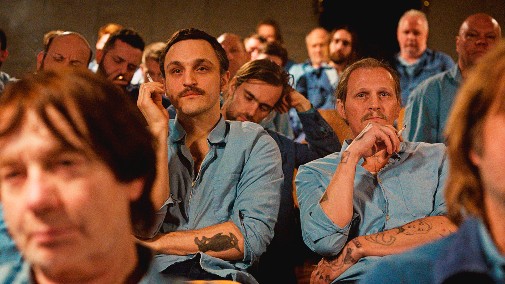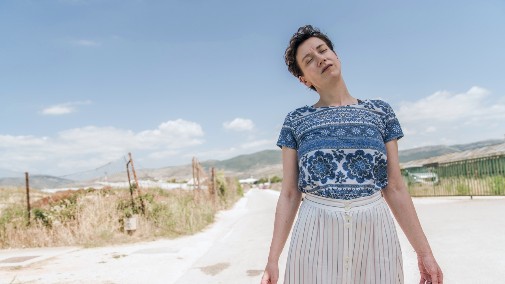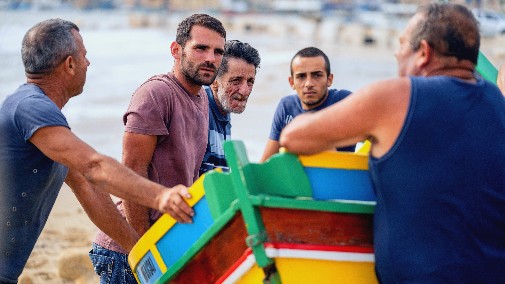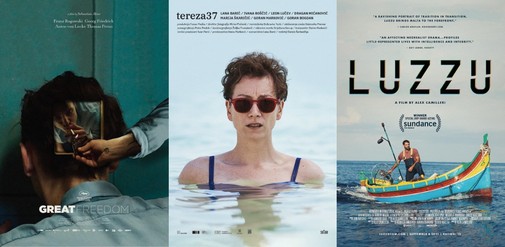Our voyage around the world through Best International Film Oscar submissions is coming to an end. Tomorrow, the Academy will reveal its shortlist, reducing 92 contenders to just 15. Before that, though, I'd like to shine a light on three fantastic films, regardless of their awards chances. They are a jewel of queer cinema from Austria, a prickly character study from Croatia, and a throwback to the early days of Neorealism courtesy of Malta. At the end of this piece, I shall also reveal what films would make up my ideal Oscar shortlist…

GREAT FREEDOM (Austria)
Allied victory did not mean freedom for the gay men imprisoned by the Nazis. Indeed, Paragraph 175 of the German Criminal Code made many victims until its final deletion in 1994. Hans Hoffmann is one of them, a man who left the concentration camps to be promptly incarcerated in an American-controlled prison, starting a never-ending cycle in which every release is followed by the swift return to a life behind bars. That doesn't mean his pursuit of happiness, freedom, pleasure, and love ever ceases. If there's one thing that defines Franz Rogowski's character is his stubbornness, an unwillingness to give up in the face of oppression.
And yet, neither the actor nor director Sebastian Meise is interested in making Hans a figure of idealized inspiration. Great Freedom is not some ennobling portrait of the homosexual martyr. Instead, it's a collection of moments strewn through time, a collage that paints the striking picture of a man's desire. While it's deliciously horny, it's not a unilaterally carnal picture either, regarding the bonds of homosocial friendship with curiosity, even tenderness. Rogowski has never been better, and he excels at that negotiation between sensuality, vulnerability, tragedy. His shifting body tells a complex story all on its own, but his greatest gift may be the easy chemistry with all costars, especially the formidable Georg Friedrich.
The images Meise comes up with are as brilliant as the actors. A match in the darkness connects out-of-order chronology, a flame of kindness transcending time. A friend offers a hug to help another man cope with grief while guards try to separate them, beating the one cradling his crying comrade. Dates in an open courtyard at night, bodies huddled in the cold and darkness, trying to forge a sense of intimacy in a place where that cannot exist. Sex is a cure for addiction, a love language, and a way to celebrate the self, the velvety shadows in a labyrinth of passion. A-/A

TEREZA37 (Croatia)
A woman slumbers in her bed, alone amid the white sheets. As she turns, we see the shock of red blood covering her underwear. Tereza has suffered a miscarriage, a traumatic event if there ever was one. Yet, observing her as she cleans up the mess, one realizes it's become something of a routine for the woman. At 37, she's had four miscarriages in a Quixotic attempt at motherhood, and she's willing to do anything to carry a pregnancy to term. She feels her life is unfulfilled without a child she can call her own. A happy marriage, beautiful home, strong friendships, and thriving career on stage aren't enough, not for Tereza.
In this desperate state, a doctor's dismissive joke becomes a last ray of hope. If she can't conceive with her husband, why not try other men? Though Tereza's reaction appears nonplussed, the idea plants a seed in her mind. It becomes a mission to seduce as many men as possible, to use them like unwitting sperm donors. As both lead actress and screenwriter, Lana Baric uses the title character's sexual misadventures to paint a complex societal mural, highlighting the limiting gender norms of modern Croatia, the ghost of outdated tradition in contemporary mores. Even women can perpetuate machismo and make femininity into a toxic thing.
Deadpan hilarity reigns supreme along with terminally sunny cinematography, but that doesn't mean horror is out of sight. This is no mere comedy of manners or the zany chronicles of a bored wife's infidelities. When violence hits, it hits hard, resulting in a visceral nightmare of autonomy denied. Director Danilo Servedzija's tonal negotiations are impressive in these harrowing passages, never calling attention to their craft while exploring Baric's ideas through visual idioms. Actress/writer and director prove themselves a formidable duo, bringing Tereza37 to an inconclusive ending whose ambiguity feels honest and character-specific. B+

LUZZU (Malta)
Luzzu is the name of a traditional Maltese fishing boat, usually painted in bright colors with a pair of eyes on its bow. Even though one such vessel dominates the narrative of Alex Camilleri's Luzzu, it's far from the most colorful part of any given frame. Not when the Mediterranean is present, shining with impossible blues through Léo Lefèvre's cinematography. The azure wonder establishes a sense of place and the magnetic pull that the sea holds for our protagonist. He's Jesmark, the latest in a long lineage of fishermen. However, he's got responsibilities that pull him from the waves, a baby to care for, and a partner who demands he move on from ancient tradition.
Other films might have fallen into clichéd tropes when handling Jesmark's dilemmas, but Luzzu never does. While the narrative's as familiar as the Neorealist style Camilleri favors, there's profound empathy in the telling of this story. As played by non-actor Jesmark Scicluna, the fisherman is someone whose sense of self depends on the sea. The boat is part of who he is, part of a history shared across generations. To give it up hurts. Luzzu might acknowledge that living in today's world makes such choices necessary, that they are the right thing to do for the good of this family. Still, the cineastes make sure to showcase the pain it entails, to honor it.
The conflict between tradition and modernity isn't easy, nor is it clear-cut. It becomes even more multifaceted when staged within a community riddled with economic precarity where the temptation of crime is ever-present. It'd be disrespectful to flatten it into a simple moral binary. On many occasions, neither characters nor viewers can be sure about the right path to follow, which feels honest. Even at the end, when Jesmark's fate seems set in stone, Camilleri maintains a sense of mystery around his seafaring hero. The script may explore the man's complex interiority, but a part of him will always remain unknown, beautifully so. B+
Oscar odds? Tereza37 feels DOA as far as AMPAS is concerned. However, both Great Freedom and Luzzu could make it. The Austrian flick gained many fans in Cannes, and its travail through the festival season only intensified the acclaim. On the other hand, Luzzu got good notices at Sundance and is one of the submissions to have been already released in American theaters. That has to count for something.
Enough about Oscar prognostication. What would happen if I chose the shortlist of 15 films that'd go forward in the race? Having watched half of the submissions, these are my favorite titles in alphabetical order:
- 107 MOTHERS, Slovakia (Venice review)
- A HERO, Iran (Cannes review)
- BAD LUCK BANGING OR LOONY PORN, Romania (NYFF review)
- DRIVE MY CAR, Japan (Cannes review, NYFF review, screenplay FYC)
- FLEE, Denmark (Sundance review, Doc Corner, picture FYC, sound FYC)
- GREAT FREEDOM, Austria
- I'M YOUR MAN, Germany (review)
- MEMORIA, Colombia (Cannes review, NYFF review)
- PLAYGROUND, Belgium (review)
- TEREZA37, Croatia
- PRAYERS FOR THE STOLEN, Mexico (review, interview with the director)
- THE METAMORPHOSIS OF BIRDS, Portugal (review)
- TITANE, France (Cannes review, NYFF review)
- UNCLENCHING THE FISTS, Russia (review)
- YUNI, Indonesia (review)
Honorable mentions include Argentina's The Intruder, Norway's The Worst Person in the World, and Malta's Luzzu, Greece's Digger, and Brazil's Private Desert. Even though I watched 46 films, there are still many other submissions I'm curious to see. Because I've admired some of the directors' past works, I'm particularly excited for Bolivia's The Great Movement, Chad's Lingui: The Sacred Bonds, and Morocco's Casablanca Beats.
What about you, dear reader? What films would make up your Best International Film shortlist?
